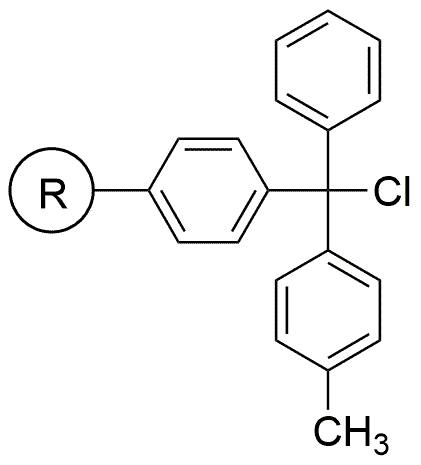4-Methyltrityl chloride resin is widely utilized in research focused on:
- Solid-Phase Peptide Synthesis: This resin serves as a key support material for synthesizing peptides, allowing for efficient attachment and cleavage of amino acids, which streamlines the process and enhances yield.
- Drug Discovery: In pharmaceutical research, it is used to create libraries of peptide compounds, facilitating the identification of potential drug candidates through high-throughput screening.
- Bioconjugation: The resin's reactive sites enable the attachment of biomolecules, aiding in the development of targeted therapies and diagnostic tools in biomedicine.
- Analytical Chemistry: It is employed in chromatography techniques for separating and purifying complex mixtures, improving the accuracy of analytical results.
- Custom Resin Development: Researchers can modify the resin for specific applications, allowing for tailored solutions in various chemical synthesis processes, which enhances versatility compared to standard resins.
General Information
Properties
Safety and Regulations
Applications
4-Methyltrityl chloride resin is widely utilized in research focused on:
- Solid-Phase Peptide Synthesis: This resin serves as a key support material for synthesizing peptides, allowing for efficient attachment and cleavage of amino acids, which streamlines the process and enhances yield.
- Drug Discovery: In pharmaceutical research, it is used to create libraries of peptide compounds, facilitating the identification of potential drug candidates through high-throughput screening.
- Bioconjugation: The resin's reactive sites enable the attachment of biomolecules, aiding in the development of targeted therapies and diagnostic tools in biomedicine.
- Analytical Chemistry: It is employed in chromatography techniques for separating and purifying complex mixtures, improving the accuracy of analytical results.
- Custom Resin Development: Researchers can modify the resin for specific applications, allowing for tailored solutions in various chemical synthesis processes, which enhances versatility compared to standard resins.
Documents
Safety Data Sheets (SDS)
The SDS provides comprehensive safety information on handling, storage, and disposal of the product.
Product Specification (PS)
The PS provides a comprehensive breakdown of the product’s properties, including chemical composition, physical state, purity, and storage requirements. It also details acceptable quality ranges and the product's intended applications.
Certificates of Analysis (COA)
Search for Certificates of Analysis (COA) by entering the products Lot Number. Lot and Batch Numbers can be found on a product’s label following the words ‘Lot’ or ‘Batch’.
Número de catálogo
Número de lote/lote
Certificates Of Origin (COO)
This COO confirms the country where the product was manufactured, and also details the materials and components used in it and whether it is derived from natural, synthetic, or other specific sources. This certificate may be required for customs, trade, and regulatory compliance.
Número de catálogo
Número de lote/lote
Safety Data Sheets (SDS)
The SDS provides comprehensive safety information on handling, storage, and disposal of the product.
DownloadProduct Specification (PS)
The PS provides a comprehensive breakdown of the product’s properties, including chemical composition, physical state, purity, and storage requirements. It also details acceptable quality ranges and the product's intended applications.
DownloadCertificates of Analysis (COA)
Search for Certificates of Analysis (COA) by entering the products Lot Number. Lot and Batch Numbers can be found on a product’s label following the words ‘Lot’ or ‘Batch’.
Número de catálogo
Número de lote/lote
Certificates Of Origin (COO)
This COO confirms the country where the product was manufactured, and also details the materials and components used in it and whether it is derived from natural, synthetic, or other specific sources. This certificate may be required for customs, trade, and regulatory compliance.


